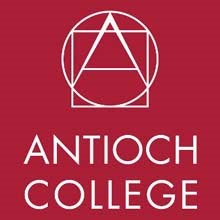
Antioch McGregor President Dr. Michael Fishbein and his wife Mary Ann Oppenheimer met the community at a reception in the YSI All Purpose Room at AUM Tuesday evening. After opening remarks by Chairman of the McGregor Board Phil Parker (Dayton Chamber of Commerce) and Vice Chair Dan Young (YS Chamber), Dr. Fishbein delivered the following address:
Please join me in appreciation of the warm welcome offered by my new friends, Phil Parker and Dan Young…
As most of you know, I am a newcomer to Yellow Springs. And from the very beginning, the 19th century date about which I heard so much was 1852, when the College first opened its doors. But surely, I thought, Yellow Springs predates even Horace Mann. So, as a trained academic, I did a little research and I’d like to tell you about it briefly.
Yellow Springs was founded in 1825, just over a quarter century before the College was born. It was founded by the followers of one Robert Owen, a Welsh social reformer born in 1771.
Owen had some interesting ideas.
First, he believed that a person’s character was formed entirely by interaction with the environment and, as a result, no one could be held responsible for his actions. Now, I am a social psychologist. Social psychologists believe that behavior is influenced far more than people suspect by the unseen impact of the presence of others or pressures placed upon them by the situation in which they find themselves. As you can see, Robert and I are pretty much on the same page.
Second, Owen favored what some have called the workshop system of production. The workshop, unlike the factory system of that day, essentially allowed a manufacturer to hire craftsmen as needed. Again, as a professional academic, the system of full-time and adjunct faculty could be argued to draw their lineage from the concept of the workshop system in which individual subcontracts substitute for the need of a university to employ all of the faculty directly all of the time. Almost feels like I’m channeling…
Now, Owen’s life included a time as the owner of the New Lanark mill in Glasgow, Scotland. Later in his life, after a falling out with William Allen and some of his other partners, Owen resigned all connection with New Lanark in 1828. His actual words to William Allen at the time are often quoted as being: "All the world is queer save thee and me, and even thou is a little queer." This, too, resonates intimately because my father was fond, in moments of exasperation to say that “all the world was mad, except thee and me, and I have my doubts about thee.” It’s even possible that you’re looking at Robert Owen’s long-lost missing Jewish great-great-great-great grandson.
Owen also had some rather Christopher Hitchens-like observations about religion, but why disturb a festive occasion like this one? But, I’ve concluded—on the strength of my research—that I’ve actually been connected to Yellow Springs longer than anyone in this room…
On September 4th of this year, Yellow Springs turned a page, dipped its pen in new ink, and began to record the history of a new future. One in which, as Rick Detweiler put it that day, Yellow Springs is home to two great institutions of higher learning. It is altogether fitting that you have heard much in recent days of what the College hopes to do. I would like to share with you, as our neighbors in Yellow Springs, the aspirations we hold for Antioch University McGregor.
Antioch McGregor is, as you know, the only campus in the region whose commitment to working adults is embedded in its DNA. Since our inception as the School for Adult and Experiential Learning, our undergraduate degree completion programs and graduate degrees have been designed for working adults.
Antioch University McGregor has for more than two decades quietly, persistently, and with uncommon excellence, served the adult learners of the Dayton region. Now it faces three challenges on which our planning efforts have focused. Community, Identity, and Program Diversity.
I’d like to tell you about each one briefly.
Any matter of great moment has the capacity to disrupt the sense of community…and Antioch McGregor has been both a participant and a witness to turbulent times in Yellow Springs and globally. Now, we seek to embrace Yellow Springs once again as a partner in its fortunes. We have already sought to engage through the Yellow Springs Nonprofit Network. We are in discussions with the Arts Council in hopes of hosting a portion of their permanent collection and becoming a venue for the display of works by local artists. Our strategic plan, now in development, seeks to make presentations by students and faculty public events at which members of the Yellow Springs community are welcome.
To be sure, we look to serve the Dayton region. We intend to strengthen our links northwest toward Springfield and to the south to Xenia and Wilmington. In short, we will renew or create the bonds that will allow the region to benefit from the niche programs and special excellence we possess. We hope, in time, to explore collaborations across the village.
We are building a clear sense of the mission and vision of Antioch McGregor. Here, among our alumni and friends, our vision is clear: we “contribute to the betterment of the individual and the community by fostering academic excellence as the preeminent provider of socially responsive, flexible, and innovative education programs for adult learners.” Now, truth be told, I added a word there, as in ‘preeminent provider of social response, flexible, and innovative education programs for adult learners.’ But, too many of our prospective friends and neighbors think we remain linked to Antioch College or are simply not aware of the unique opportunities we provide. Too many community college students do not understand that Antioch McGregor recognizes the quality of their achievement with the most flexible transfer options anywhere in the region. They will soon.
Those who reside here because of Wright-Patt may not know that Antioch University McGregor provides master’s degrees in fields that are critical to the success of its vast enterprises and invaluable to those responsible for its management. They will soon.
Unique to Antioch is our commitment to social justice and small-d democratic education. Our students graduate with considerably more than the professional abilities that give them value in the marketplace. They understand that our lives matter in proportion to the degree we care about and seek to leave the world a better place than we found it. I have already reached out to faith communities in the region. Later next week, faith leaders from Yellow Springs will gather with me to talk about ways in which McGregor becomes a venue from which we can address issues of common concern and debate in an atmosphere of civility and respect the issues that divide or society. In short, I intend that everyone in the Dayton region will know who we are and what we can and do contribute to their lives.
Finally, we intend to expand our programs. We intend to remain a premier teacher education resource. To become a prominent leader in conflict analysis and in management. To provide opportunities in our individualized programs for intrepid explorers to forge new pathways. But, we also intend to contribute to what has become the world’s most critical existential problem of energy and sustainability. And to provide solutions to the vexing challenges of navigating the world of health care options and choices.
Our campus is named for Douglas McGregor, thirteenth president of Antioch College. He may today have become lost in the spate of management theories that have come and gone in the decades since the publication in 1960 of the Human Side of Enterprise. In McGregor’s mind, Theory X was the top-down, worker as drone, autocracy. McGregor’s Theory Y saw that human beings possessed aspirations and talents and that organizations were the better for finding ways to free them. Now it turns out that McGregor expressed some anxiety as Theory Y became as encrusted and baroque as the Theory X it sought to demolish. But this much remains true: McGregor recognized that at the heart of every academic and business enterprise lies the impulse to humanity. He understood that education at its best did not seek to fit human beings into preset schemes; that human aspirations to self-motivation, to creativity and to justice were as natural as the air we breathe. While others may have experimented with fad or fancy, Antioch McGregor has for more than two decades understood that our students want to be the difference they seek in the world. It is my hope and my intention to assure that we earn a new prominence based on the fact that your neighbors, your colleagues, your friends, your families want nothing less.
Let me thank you all for joining us today. I would now very much like to step away from this podium and greet as many of you as I can.
Thank you.








No comments:
Post a Comment